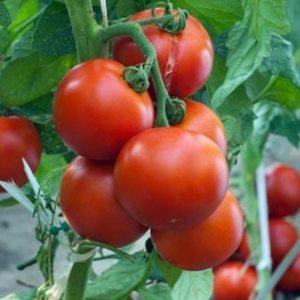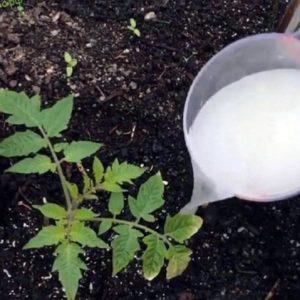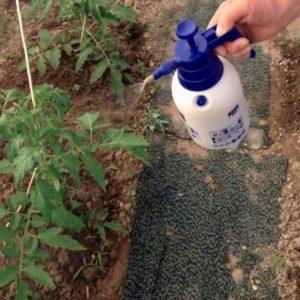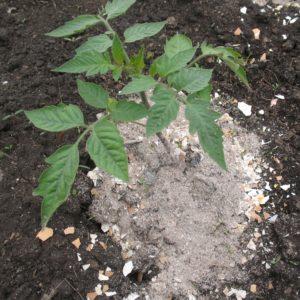How to feed tomatoes during flowering in a greenhouse and fruiting
A pumpkin-sized tomato on a private plot sounds intriguing, doesn't it? This is the crop that one American farmer recently received. The weight of the tomato grown by him exceeded 3.5 kg. I wonder how often you had to water it? It is a pity that the record holder did not share the secret of growing a giant.
Surely, without fertilizing the fruiting plant, it was not done. It is only known that the harvest was obtained in a greenhouse. Let's take a look at how you can feed tomatoes in the greenhouse during flowering and fruiting to increase yields.
The content of the article
Signs of a deficiency of elements in tomatoes
Experienced gardeners advise feeding tomatoes 3 times - in each of the phases (buds, flowers, fruits). Top dressing is of two types: Both species are equally beneficial for plants. And it's better to alternate them. Although many tomato lovers prefer to do foliar treatments. Leaves are best done: You may be interested in: how to water tomatoes in the heatto get a good harvest. If you do not adhere to these rules and feed the tomatoes at other times of the day or under different weather conditions, then feeding will not be as effective. Part of the solution will evaporate and will not have time to be absorbed. Plus, plants can get burned by bright sunlight. Important! An excess of fertilizer is just as bad for tomatoes as a lack of it. Garden stores offer many types of fertilizers and growth promoters. You can feed tomatoes with the help of drugs: If pests (aphids or caterpillars) attack tomatoes, you can get rid of them with the help of drugs "Biotin", "Fitoverm" or "Iskra". Read also: top 20 best ways to pickle the garlic. You can help plants without resorting to purchased drugs. Consider how experienced tomato growers feed plants with folk remedies without chemistry:
Note. Boric acid and ammonia are more profitable to buy not in garden stores, but in a pharmacy. When the plants enter the fruiting phase, an ash solution is considered the best feeding of tomatoes. They can be fertilized both under the root and sprayed over the foliage. Ash increases the keeping quality of fruits (long-term storage) and protects the plant from the development of diseases. find out in our articlewhich varieties are in the top 25 sweetest tomatoes. Top dressing, which are discussed in this article, will help saturate plants with useful substances, prevent diseases and increase tomato yield by at least 20%. The most important thing is to keep the proportions. You can use purchased products as a fertilizer or use folk recipes. A good result is achieved with three dressings: during budding, during flowering and when tomatoes are ripe. Rich and ripe harvests for you! Plants should be fed not only for What is tomato feeding for?
Plants should be fed not only for What is tomato feeding for?
 After planting in the ground, tomatoes are usually fed. After all, transportation and transfer - always stress for plants. During fruiting and flowering, tomatoes also need additional fertilization.
After planting in the ground, tomatoes are usually fed. After all, transportation and transfer - always stress for plants. During fruiting and flowering, tomatoes also need additional fertilization.
 Pros of foliar dressing:
Pros of foliar dressing:
Purchased drugs
Folk remedies
How to feed
How to make
A comment
Boric acid solution
Dilute 0.5-1 teaspoon of boric acid in 10 liters of water. Treat the aerial part of the plants with a spray bottle
If boric acid is not in solution, but in crystals, dissolve it in hot water. In the cold, the crystals will not disperse. Burns may remain on tomato leaves
Ash solution with boric acid
Take stove wood ash or ashes from a fireplace. Mix one liter of ash and 10 liters of water. For better dissolution of nutrients, you can boil the mass. Add half a teaspoon of boric acid. Stir and foliar feed. Spray the plants with the resulting solution
The effect is noticeable already on the third day after treatment
Yeast starter
Pour 100 g of fresh baker's yeast with three liters of water. Add 50 g of sugar and leave to ferment. When bubbles stop forming, add one glass of ash. The sourdough is used for root dressing
Before feeding tomatoes, it is better to water the ground with plain water.
Ammonia solution
Dilute 40 ml of ammonia into 10 liters of water. Pour the solution over the tomatoes
Substance consumption - 0.5 liters per bush
Milk iodine solution
Add to one liter of milk:
Sugar content and fruit setting increases. Reduces the risk of plant disease with root rot and late blight
Green herbal infusion
Prepared in a barrel. For 100 l, barrels are taken:
Insist for 14 days, then water the tomatoes 0.5-1 liters under the bush
How to feed tomatoes during flowering in the greenhouse and fruiting?
 During the flowering of tomatoes, experienced gardeners advise feeding tomatoes in two ways:
During the flowering of tomatoes, experienced gardeners advise feeding tomatoes in two ways:
Conclusion